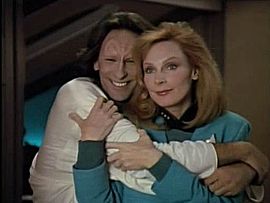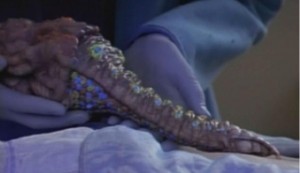 James McGrath of the blog Exploring Our Matrix recently brought an item to my attention from i09, a post by Charlie Jane Anders titled “Big Theological Questions that Science Fiction Should Answer.” The essay notes that science fiction frequently addresses theological questions, but suggests a different series of questions that are largely unexplored. This piece makes for a companion with another essay at the site titled “The 7 Deadly Sins of Religion in Science Fiction,” which while very good, should have, in my opinion, been expanded with the addition of number “8: Simplistic religion-bashing in the name of science.”
James McGrath of the blog Exploring Our Matrix recently brought an item to my attention from i09, a post by Charlie Jane Anders titled “Big Theological Questions that Science Fiction Should Answer.” The essay notes that science fiction frequently addresses theological questions, but suggests a different series of questions that are largely unexplored. This piece makes for a companion with another essay at the site titled “The 7 Deadly Sins of Religion in Science Fiction,” which while very good, should have, in my opinion, been expanded with the addition of number “8: Simplistic religion-bashing in the name of science.”
These items are of interest for several reasons. First, a recent press release from the University of Valencia argued that science fiction is not being utilized as a tool to foster student interest in the sciences. (See i09s discussion on this here.) Second, I would build on this and argue that science fiction can and should be drawn upon by theologians as a tool for theological and cultural reflection. I will argue precisely this in a 2013 journal commentary for Multnomah University in an edition dealing with gender. There I will draw upon an episode of Star Trek: The Next Generation titled “The Host,” in which Dr. Beverly Crusher falls in love with a humanoid alien, Odan, who later becomes deathly ill. Dr. Crusher comes to discover that the real Odan is a small, slug-like creature who exists in symbiotic fashion within a humanoid host. Dr. Crusher wrestles with and ultimately comes to accept this situation, until Odan is transplanted into the a female host, making it impossible for Crusher to reconcile this with her ideas on gender and sexuality. In my essay commentary I will argue that since evangelical theologians believe that divine revelation takes place as the transcendent communicates through cultures, that science fiction, which postulates alternative possibilities within cultures and a distancing process which enables fresh thought on difficult issues, this means that the science fiction genre provides unique opportunities for theological reflection.
 The two posts in i09 referenced above that suggest a relationship between theology and science fiction connect with my own thinking on the issues, and I suggest that science fiction not only tackle previously neglected issues in theology, but that theologians also consider science fiction as a genre in which to wrestle in fresh ways with things like origins mythology, conservative theological assumptions about humanity being “alone in the universe,” the incarnation, and the atonement.
The two posts in i09 referenced above that suggest a relationship between theology and science fiction connect with my own thinking on the issues, and I suggest that science fiction not only tackle previously neglected issues in theology, but that theologians also consider science fiction as a genre in which to wrestle in fresh ways with things like origins mythology, conservative theological assumptions about humanity being “alone in the universe,” the incarnation, and the atonement.





2 Responses to “Science Fiction and “Big Theogical Questions””